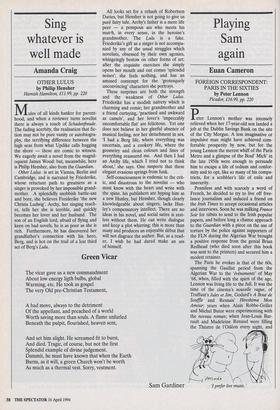Sing whatever is well made
Amanda Craig
OTHER LULUS by Philip Hensher Hamish Hamilton, £11.99, pp. 220 Mules of all kinds hanker for parent- hood, and when a reviewer turns novelist there is always a touch of Schadenfreude. The fading acerbity, the realisation that fic- tion may not be pure vanity or autobiogra- phy, the terrifying difference between the high seas from what Updike calls hugging the shore — these are comic to witness. We eagerly await a novel from the magnil- oquent James Wood: but, meanwhile, here is Philip Hensher, also from the Guardian.
Other Lulus is set in Vienna, Berlin and Cambridge, and is narrated by Friederike, whose reluctant path to greatness as a singer is provoked by her impossible grand- mother. A splendidly snobbish battle-axe and bore, she believes Freiderike 'the new Christa Ludwig'. Archy, her singing teach- er, tells her she is terrible, and quickly becomes her lover and her husband. The son of an English lord, afraid of flying and keen on bad novels, he is as poor as she is rich. Furthermore, he has discovered her grandfather's connection with his hero, Berg, and is hot on the trail of a lost third act of Berg's Lulu. All looks set for a rehash of Robertson Davies, but Hensher is not going to give us pure fairy tale. Archy's father is a mere life peer — a pompous ass who meets his match, in every sense, in the heroine's grandmother. The Lulu is a fake. Friederike's gift as a singer is not accompa- nied by any of the usual struggles which novelists, obsessed by their own agonies, whingeingly bestow on other forms of art; after the requisite exercises she simply opens her mouth and out comes 'splendid noises'; she feels nothing, and has an amused contempt for the 'grotesquely unconvincing' characters she portrays.
These surprises are both the strength and the weakness of Other Lulus. Friederike has a modish naivety which is charming and comic; her grandmother and a friend curtsying, 'practised and awkward as camels', and her lover's 'impeccably uncomfortable flat' are felicitous. Yet one does not believe in her gleeful absence of musical feeling, nor her detachment in sex. `I had a Berg life, where everything was uncertain, and a cookery life, where the geometry and clean colours and lines of everything reassured me. And then I had an Archy life, which I tried not to think about,' she says. One suspects that these elegant evasions springs from funk.
Self-consciousness is endemic to the crit- ic, and disastrous to the novelist — who must know with the heart and write with the spine. his publishers are hyping him as a new Huxley, but Hensher, though clearly knowledgeable about singers, lacks Hux- ley's compensatory intellect. There are no ideas in his novel, and social satire is zest- less without them. He can write dialogue and keep a plot whirring; this is more than many and produces an enjoyable debut that will not disgrace the author. But, as a read- er, I wish he had dared make an ass of himself.


























































 Previous page
Previous page